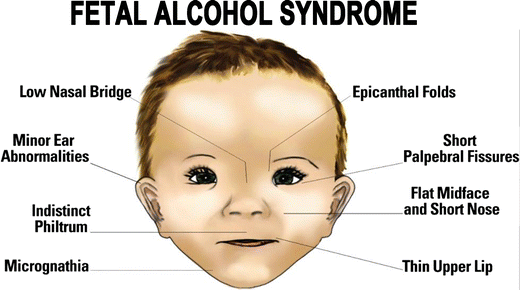Fetal Alcohol Spectrum Disorders

Fetal alcohol spectrum disorders (FASDs) are a group of condition that can occur to a person whose mother drank alcohol during the pregnancy. The physical and mental deficiencies, which usually last for life, often include trouble with learning and remembering, understanding and following directions, controlling emotions, communicating and socializing, and daily life skills, such as feeding and bathing. Some of the disorders include the following:
|
Etiology
These disorders are caused by alcohol consumption by the mother during the pregnancy. The alcohol in the mother’s bloodstream crosses the placenta. Alcohol can interfere with oxygen and nutrient delivery in the growing baby. It can also harm the development of tissues and organs.
Signs and Symptoms
The signs and symptoms depend on the amount of alcohol consumed during the pregnancy and the time in pregnancy when it was consumed. Common signs and symptoms include:
- Poor memory, hyperactive behavior, difficulty with attention nad math concepts
- Speech and language delays, learning and intellectual disabilities
- Poor reasoning and judgment skills
- Vision or hearing problems
- Poor coordination, small head size, shorter-than-average height, abnormal facial features (e.g., smooth ridge between the nose and upper lip)
- Heart, kidney, or bone problems
Diagnostic Procedures
Knowing at delivery that the mother drank alcohol during the pregnancy can help with early diagnosis. At birth a thorough assessment will be done. The provider will assess for issues during childhood. The child will be screened for cognitive, learning, and language development delays. Health issues, along with social and behavioral problems, will also be monitored.
Treatments
There is no cure for FASDs. Early intervention can help reduce some of the effects. Not drinking alcohol during pregnancy is the only way to prevent FASDs.
See also:
- Centers for Disease Control and Prevention. Fact sheet—binge drinking. http://www.cdc.gov/alcohol/fact-sheets/bing-drinking.htm. Accessed July 24, 2014.
- National Institute on Alcohol Abuse and Alcoholism. Underage Drinking. Opt. cit.
- Fujii H, Kawada N. Fibrogenesis in alcoholic liver disease. World J Gastroenterol. 2014;20(25):8048 – 8054.

